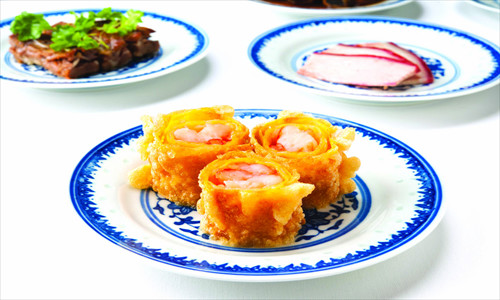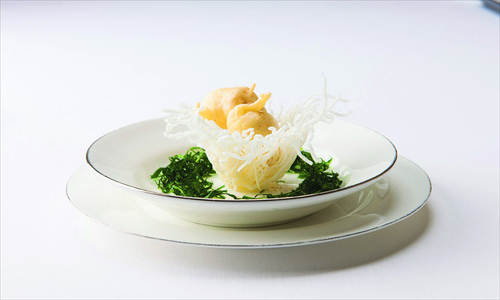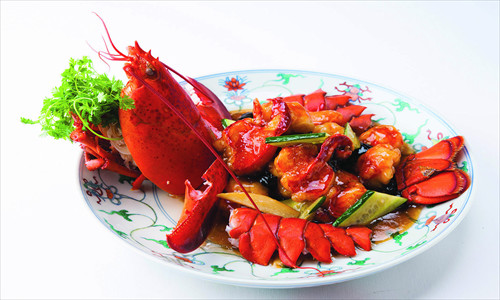


Li's Imperial Cuisine serves up shrimp-filled egg rolls (top), fried scallops and lobster. Photos: Courtesy of Li's Imperial Cuisine
Paparazzi stakeouts
Wang Xiangjun lifted her camera and snapped as celebrity couple Dong Jie and Pan Yueming walked out of Aijiangshan, a Korean barbecue restaurant frequented by the city's beautiful people.
It was a typical day for Wang, who works as a paparazzo for Sohu.com, making a living from knowing the in places where celebrities dine.
There are certain spots around town, mostly shopping districts and restaurants, that entertainment reporters like Wang stake out to catch celebrities on camera.
"Usually I patrol near Worker's Stadium, Sanlitun, Guomao, Lido and Solana, where the celebrities tend to gather," she said, describing her regular "street sweeping routine."
The stars in this town frequent a handful of places, but there's no telling where they'll show up, Wang said. The stars don't stick to a single orbit - sometimes they even go to small restaurants buried down in Beijing's winding alleyways. Depending on your luck, you just might see a celebrity walking through the door.
A top choice for Hong Kong celebrities is the Hong Kong Style Hot Pot restaurant - Chunxia Qiudong, located on Xiaoyun Lu in Chaoyang district. Also hot are Wangjiadu Hot Pot at Zonglüquan and Haidilao.
Barbecue restaurant Aijiangshan also attracts stars, and Wang said she caught not only Dong Jie and Pan Yueming there, but also Zhang Jizhong, a Chinese film director best known for his TV series adaptation of Journey to the West.
The top "street sweep" targets for paparazzos are the Lido and Solana areas. Feiteng Yuxiang, the restaurant next to Kunlun Hotel that specializes in fish filets cooked in hot chili oil, is a popular choice for celebrities such as Shi Shengjie, a famous crosstalk performer.
"Even if they are eating in the same restaurants as the public, it's difficult for them to be seen. They are usually in the private rooms," Wang said. "But it really depends on their own personality. Some stars don't go to high-end restaurants and eat by the street."
In the halls of the golden dragon
One government official interviewed for this story said that impressing a government official necessitates a trip to the Beijing Hotel, the official Diaoyutai State Guesthouse or the Great Hall of the People.
The Great Hall of the People - also where the annual two sessions that set the government's agenda take place - does not accept walk-ins.
"If you want a reservation here, your company needs to make it a month in advance," said the person answering the phone at the Hall's only public line, who refused to give his name. "Any activity held here must have an official provincial letter. We have never held anything personal like birthday parties."
Referring to online reports of celebrities and others celebrating birthdays and weddings there, he replied, "Those are not true. We never open to the public. Personal activities are not allowed."
Dianping.com, the popular restaurant review website, has 91 reviews for the Great Hall of the People, mostly from business people who dined there by invitation. They comment in amazement at the grandiose scale of the restaurant, which can accommodate 500 tables at a time.
The official Diaoyutai State Guesthouse has hosted more than 1,000 heads of state, including former US President Richard Nixon, Russian President Vladimir Putin and Queen Elizabeth II. Officials at Diaoyutai refused to let a Metropolitan reporter visit the grounds, apparently trying to preserve the location's mystique.
However, between state visits, it does allow the public to rent villas or dine there. The minimum charge for dinner is 1,500 yuan per person, excluding drinks, which must be paid in advance. Diaoyutai conveniently lists its bank details on its website for easy transfers.
A banquet at the Beijing Hotel tends to be in the same price range, although in recent years, the hotel launched a discounted rate of 500 yuan a head for those who just want a taste of official dining.
Completed in 1915, the Beijing Hotel in Wangfujing has become a symbol of upscale living and eating. The place has witnessed many state banquets and celebrations on the national level.
Tanjiacai (Tan family cuisine), one of the high-end cuisines offered at the hotel, was created by government official Tan Zongjun more than 100 years ago. Back then, the cuisine was served only in the official houses to entertain guests of high officials or the royal family. After the Qing Dynasty (1644-1911) ended, the cuisine nearly disappeared because the wealthy clients were gone. In 1958, former premier Zhou Enlai suggested the Tan family move inside Beijing Hotel to better preserve and develop their cuisine.
"There isn't a secret recipe to tanjiacai, but it's also something the ordinary people can't easily imitate," said Beijing Hotel Head Chef Wang Binghe.
For example, in braised abalone, one of the most famous dishes, the dried abalone needs to be soaked in water for three days to a week, then brewed with slow fire for a couple of hours.
"It takes the chefs much time and effort to cook. It's not a production line process. More than 10 chefs stay in the kitchen, but they only make a few dishes," Wang said.

Copyright ©1999-2011 Chinanews.com. All rights reserved.
Reproduction in whole or in part without permission is prohibited.